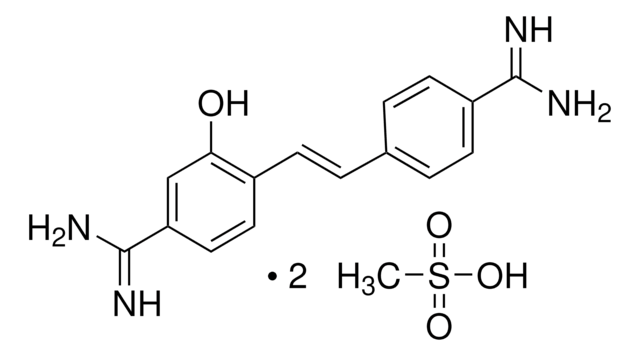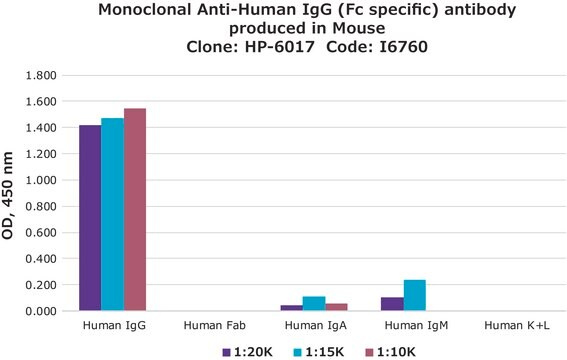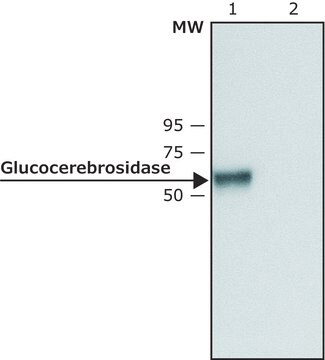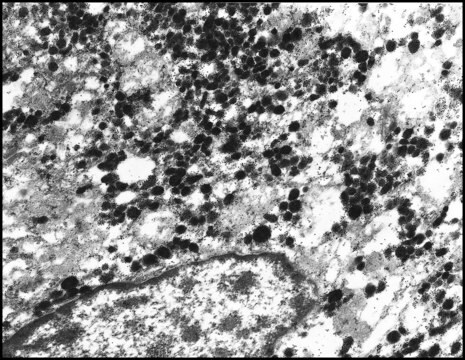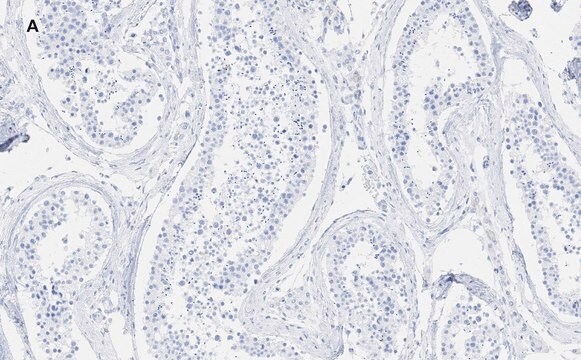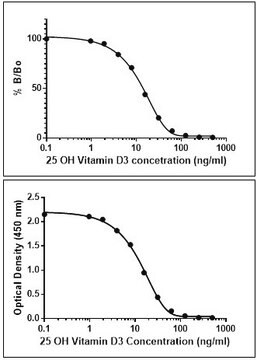AB153-I
Anti-Fluorescent Gold Antibody
from rabbit
Synonym(s):
Fluorescent Marker
Sign Into View Organizational & Contract Pricing
All Photos(2)
About This Item
UNSPSC Code:
12352203
eCl@ss:
32160702
NACRES:
NA.41
Recommended Products
biological source
rabbit
Quality Level
antibody form
purified antibody
antibody product type
primary antibodies
clone
polyclonal
species reactivity (predicted by homology)
all
technique(s)
immunohistochemistry: suitable (paraffin)
shipped in
wet ice
target post-translational modification
unmodified
General description
Fluorescent Gold (hydroxystilbamidine), better known as Fluorogold, has been a very popular fluorescent marker used to retrogradely label projection neurons. AB153 also reacts with aminostilbamidine quite nicely in frozen, 4% PFA fixed tissues.
Specificity
This antibody will react with any species sample treated with Fluorescent Gold.
Immunogen
KLH-conjugated Fluorescent Gold.
Application
Anti-Fluorescent Gold Antibody is a highly specific rabbit polyclonal antibody, that targets Fluoro-Gold & has been tested in IHC (Paraffin).
Immunohistochemistry Analysis: A representative lot from an independent laboratory detected Fluorescent Gold treated neurons in rat frontal cortex tissues (Chang, H. T., et al. (1990). J Neurosci Methods. 35(1):31-37.).
Quality
Evaluated by Immunohistochemistry in fixed frozen Fluorescent Gold treated rat cerebral cortex tissues.
Immunohistochemistry Analysis: A 1:10,000 dilution of this antibody detected Fluorescent Gold in fixed frozen Fluorescent Gold treated rat cerebral cortex tissues.
Immunohistochemistry Analysis: A 1:10,000 dilution of this antibody detected Fluorescent Gold in fixed frozen Fluorescent Gold treated rat cerebral cortex tissues.
Physical form
Format: Purified
Not finding the right product?
Try our Product Selector Tool.
Storage Class Code
12 - Non Combustible Liquids
WGK
WGK 1
Flash Point(F)
Not applicable
Flash Point(C)
Not applicable
Certificates of Analysis (COA)
Search for Certificates of Analysis (COA) by entering the products Lot/Batch Number. Lot and Batch Numbers can be found on a product’s label following the words ‘Lot’ or ‘Batch’.
Already Own This Product?
Find documentation for the products that you have recently purchased in the Document Library.
Sofia Meyer Zu Reckendorf et al.
The Journal of neuroscience : the official journal of the Society for Neuroscience, 42(12), 2474-2491 (2022-02-13)
In postmitotic neurons, several tumor suppressor genes (TSGs), including p53, Rb, and PTEN, modulate the axon regeneration success after injury. Particularly, PTEN inhibition is a key driver of successful CNS axon regeneration after optic nerve or spinal cord injury. In
Chang-Hui Chen et al.
Frontiers in neuroscience, 15, 772016-772016 (2021-11-20)
Area prostriata is a limbic structure critical to fast processing of moving stimuli in far peripheral visual field. Neural substrates underlying this function remain to be discovered. Using both retrograde and anterograde tracing methods, the present study reveals that the
Nóra Hádinger et al.
Nature neuroscience, 26(1), 116-130 (2022-12-23)
Corticothalamic pathways, responsible for the top-down control of the thalamus, have a canonical organization such that every cortical region sends output from both layer 6 (L6) and layer 5 (L5) to the thalamus. Here we demonstrate a qualitative, region-specific difference
Martín Macías et al.
Frontiers in human neuroscience, 16, 1043501-1043501 (2022-12-13)
The ability to learn motor skills implicates an improvement in accuracy, speed and consistency of movements. Motor control is related to movement execution and involves corticospinal neurons (CSp), which are broadly distributed in layer 5B of the motor and somatosensory
Patrick Lüningschrör et al.
Cell reports, 30(10), 3506-3519 (2020-03-12)
Genetic variations in TMEM106B, coding for a lysosomal membrane protein, affect frontotemporal lobar degeneration (FTLD) in GRN- (coding for progranulin) and C9orf72-expansion carriers and might play a role in aging. To determine the physiological function of TMEM106B, we generated TMEM106B-deficient
Our team of scientists has experience in all areas of research including Life Science, Material Science, Chemical Synthesis, Chromatography, Analytical and many others.
Contact Technical Service